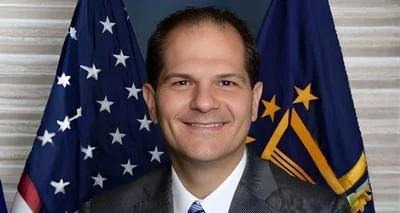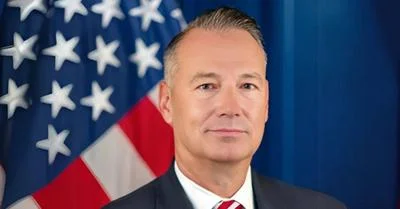State Senator Omar Aquino | Illinois General Assembly
State Senator Omar Aquino | Illinois General Assembly
According to the Illinois General Assembly site, the legislature summarized the bill's official text as follows: "Creates the Junk Fee Ban Act. Provides that it is a violation of the Act for a person to: (1) offer, display, or advertise an amount a consumer may pay for merchandise without clearly and conspicuously disclosing the total price; (2) fail, in any offer, display, or advertisement that contains an amount a consumer may pay, to display the total price more prominently than any other pricing information; (3) misrepresent the nature and purpose of any amount a consumer may pay, including the ability to refund the fees and the identity of any merchandise for which fees are charged; (4) fail to disclose clearly and conspicuously before the consumer consents to pay, the nature and purpose of any amount a consumer may pay that is excluded from the total price, including the ability to refund the fees and the identity of any merchandise for which fees are charged; or (5) offer, display, or advertise, including through direct offerings, third-party distribution, or metasearch referrals, a total price for a place of short-term lodging that does not include all required fees. Requires total price disclosures for retail mercantile establishments and food service establishments; and the disclosure of delivery fees. Provides that the Attorney General may enforce violations of the Act as an unlawful practice under the Consumer Fraud and Deceptive Business Practices Act. Preempts home rule powers."
The following is our breakdown, based on the actual bill text, and may include interpretation to clarify its provisions.
In essence, this bill establishes the Junk Fee Ban Act, which prohibits deceptive pricing practices by mandating clear disclosure of total prices for consumer goods and services. It requires that any advertised price for merchandise must include all fees upfront and be presented more prominently than partial prices. The legislation also bans misrepresentation of the nature and refundability of fees and mandates complete fee disclosure for short-term lodging advertisements. Retail and food service establishments must notify consumers of total prices prior to purchase using reasonable methods but are not required to include total prices in initial displays. Third-party delivery services must comply with fee disclosure requirements, although the establishments are not liable for third-party failures. The Illinois Attorney General is empowered to enforce violations as unlawful practices under the Consumer Fraud and Deceptive Business Practices Act. The bill preempts local home rule powers regarding price disclosure, giving the state exclusive authority in this area.
Omar Aquino has proposed another five bills since the beginning of the 104th session.
Aquino graduated from Loyola University Chicago in 2009.
Omar Aquino is currently serving in the Illinois State Senate, representing the state's 2nd Senate District. He replaced previous state senator William Delgado in 2017.
Bills in Illinois follow a multi-step legislative process, beginning with introduction in either the House or Senate, followed by committee review, floor debates, and votes in both chambers before reaching the governor for approval or veto. The General Assembly operates on a biennial schedule, and while typically thousands of bills are introduced each session, only a fraction successfully pass through the process to become law.
You can read more about bills and other measures here.
| Bill Number | Date Introduced | Short Description |
|---|---|---|
| SB1486 | 01/31/2025 | Creates the Junk Fee Ban Act. Provides that it is a violation of the Act for a person to: (1) offer, display, or advertise an amount a consumer may pay for merchandise without clearly and conspicuously disclosing the total price; (2) fail, in any offer, display, or advertisement that contains an amount a consumer may pay, to display the total price more prominently than any other pricing information; (3) misrepresent the nature and purpose of any amount a consumer may pay, including the ability to refund the fees and the identity of any merchandise for which fees are charged; (4) fail to disclose clearly and conspicuously before the consumer consents to pay, the nature and purpose of any amount a consumer may pay that is excluded from the total price, including the ability to refund the fees and the identity of any merchandise for which fees are charged; or (5) offer, display, or advertise, including through direct offerings, third-party distribution, or metasearch referrals, a total price for a place of short-term lodging that does not include all required fees. Requires total price disclosures for retail mercantile establishments and food service establishments; and the disclosure of delivery fees. Provides that the Attorney General may enforce violations of the Act as an unlawful practice under the Consumer Fraud and Deceptive Business Practices Act. Preempts home rule powers. |
| SB1484 | 01/31/2025 | Creates the Facilitating Voting By All Eligible Citizens Act. Provides that all eligible citizens shall cast a ballot in every general election. Provides that an eligible citizen who casts a blank ballot in a general election shall satisfy the requirement. Provides that no fine, fee, or penalty shall be assessed if an eligible citizen does not cast a ballot in a general election. |
| SB1485 | 01/31/2025 | Amends the Seizure and Forfeiture Reporting Act. Provides that each law enforcement agency that seizes, forfeits, or receives property subject to reporting under the Act shall report certain information about each seizure and forfeiture of property to the Illinois State Police no later than 60 days after December 31 of the year in which the property is seized or forfeited. Adds certain required information, including the accused person's race, sex, age, and zip code, as well as a citation to the statutory authorities under which the property was seized and the accused person was arrested, to the information to be submitted in a report. Adds certain required information from court records about each forfeiture of property to the information to be reported to the Illinois State Police. Provides that if an agency did not seize, forfeit, receive, or spend forfeiture funds, it shall file a null report with the Illinois State Police. Provides that the annual report shall include an aggregate summary of all seizures and forfeitures carried out and their respective proceeds, as well as other information, including categories of expenditures, such as investigation and litigation expenses, software, hardware, appliances, canines, surveillance technology, IMSI catchers, operating expenses, and administrative expenses. Provides that the Illinois State Police shall post annually on its website aggregate data for each law enforcement agency with certain information. Provides that the Illinois State Police shall, 120 days after the end of each calendar year, submit to the General Assembly, Attorney General, and Governor, as well as post on its website, a written report that summarizes certain activity in the State for the preceding year regarding property seized and related expenditures at the State and local levels, with categorized accounting and other requirements. Provides that the Illinois State Police may include certain recommendations in its report. Provides that the Illinois State Police shall, on or before January 1, 2026 (rather than 2019), establish and implement the requirements of this Act. Makes other changes. |
| SB1487 | 01/31/2025 | Amends the Illinois Health Facilities Planning Act. Makes a technical change in a Section concerning the short title. |
| SB1263 | 01/28/2025 | Amends the Nursing Home Care Act and the Specialized Mental Health Rehabilitation Act of 2013. Provides that residents of nursing home facilities have the right to outdoor access. Provides that residents of nursing home facilities and consumers served by mental health rehabilitation facilities shall be free to enter and leave the facilities as they choose. Provides that a facility may suspend this right only if the resident's or consumer's physician examines the resident or consumer and determines that leaving the facility would pose a danger to other residents or consumers or an immediate and substantial danger to the resident's or consumer's safety and well-being, which shall be explained to the resident or consumer and documented in the resident's or consumer's medical chart. |
| SB0169 | 01/17/2025 | Amends the Student Investment Account Act. Allows the State Treasurer to originate, guarantee, acquire, and service refinance loans; invest in, and enter into contracts with, institutions that provide refinance loans; deposit funds with financial institutions that provide refinance loans; establish specific criteria governing the eligibility of entities to participate in the making of refinance loans; charge and collect premiums for insurance on refinance loans; and deduct from a State employee's salary, wages, commissions, and bonuses the recovery of a refinance loan debt. Removes language allowing the State Treasurer to: enter into income share agreements with participants, facilitate income share agreements between participants and eligible income share agreement providers, and perform other acts as may be necessary or desirable in connection with income share agreements; enter into contracts and guarantee agreements as necessary to operate the Student Investment Account with income share agreement providers or qualified income share agreement organizations; establish specific criteria governing the eligibility of entities to participate in the making of income share agreements; pay income share agreement providers or qualified income share agreement organizations an administrative fee in connection with services provided pursuant to the Student Investment Account; charge and collect premiums for insurance on income share agreements; and deduct from a State employee's salary, wages, commissions, and bonuses the recovery of an income share agreement. Allows (rather than requires) the State Treasurer to establish fees to cover the costs of administration, recordkeeping, marketing, and investment management related to the Student Investment Account. Removes language allowing moneys in the Student Investment Account Assistance Fund to be used to provide assistance to income share agreement participants. Makes conforming changes. |






 Alerts Sign-up
Alerts Sign-up